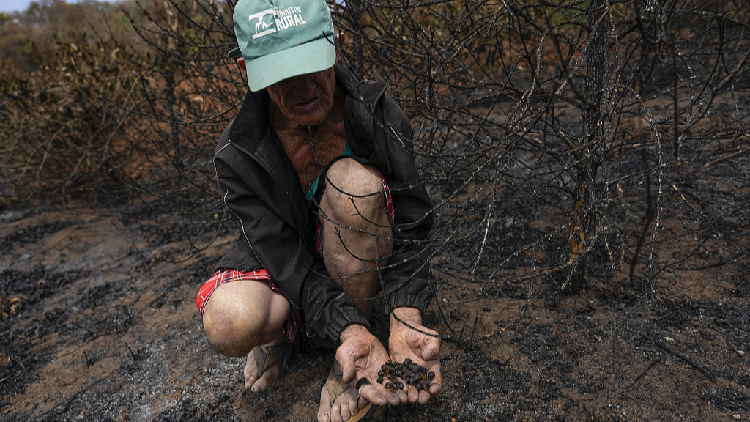Severe weather conditions poised to drive up coffee prices further
Severe weather conditions are poised to elevate coffee prices even further.

However, Almeida is currently facing water shortages on his modest farm located in Caconde, a significant area for coffee cultivation in Sao Paulo state, hindering the growth of his coffee beans.
In Brazil, the largest coffee producer globally, Almeida and fellow farmers are contending with the nation's worst drought in over seventy years, combined with higher-than-average temperatures. Almeida initially anticipated harvesting 120 sacks of coffee beans this season, but he ended up with only 100.
"Given the conditions here, the 2025 crop is already affected," he remarked, indicating a section of his plantation where flower buds had withered before they could bloom. "I won't say it's doomed, because with God anything is possible. But based on the situation, it's already compromised."
The current coffee harvest season in Brazil, ending this month, has shown minimal change from last year, despite a surge in exports. Nevertheless, the relentless drought is already posing challenges for the upcoming 2025/2026 season, according to a report from the Center for Advanced Studies on Applied Economics at the University of Sao Paulo's agribusiness school.
Simultaneously, Vietnam, the second-largest coffee producer, is also facing heat and drought, impacting its coffee crops. This potential supply shortage in both Brazil and Vietnam has begun to push global coffee prices higher, as noted in the report.
The coffee market is keeping a close watch on how Brazilian plants respond to these challenging climate conditions, which might prevent flowers from blooming, turning into cherries, or producing high-quality beans. Felippe Serigati, who heads the master's program in agribusiness at the Getulio Vargas Foundation in Sao Paulo, weighed in on the situation.
"It could result in a smaller coffee harvest," Serigati stated. "Since the market tends to anticipate these movements, we've already seen the price of arabica coffee in New York and robusta in Europe trading at higher levels."
While coffee prices have not reached the record highs of the late 1970s—when a devastating frost destroyed 70 percent of Brazil's coffee plants—they have escalated significantly in recent years.
In August, the International Coffee Organization's Composite Indicator Price, which averages various types of green coffee bean prices, was reported at $2.38 per pound, a nearly 55 percent increase from the previous year.
This price surge is partially attributed to rising demand, particularly in Asia. Weather-related issues such as drought, frost, and fire have damaged as much as one-fifth of the growing areas for Arabica coffee producers in Brazil, according to Billy Roberts, a senior economist for food and beverage at CoBank, based in Colorado.
"It's not looking like it will get that much better in the near term. They will need consistent rainfall to recover," he explained.
In addition, uncontrolled wildfires, often caused by human activity, have devastated both protected areas and farms across Brazil. One such fire swept through Caconde just last week.
As a local public school math teacher, Almeida assisted in assessing the damage for a regional association. So far, he estimates that the fires have impacted 519 hectares, with half being native Atlantic Forest, 30 percent pasture, and 15 percent coffee plantations.
On his own land, 2,000 out of 15,000 coffee plants were destroyed. His neighbor, Joao Rodrigues Martins, suffered even greater losses, losing all 2,500 of his coffee plants from a small plot, which now lies entirely blackened by soot. The coffee that Martins sells to a local cooperative constitutes his livelihood and helps cover his son's medical expenses.
For small-scale farmers, the devastation of years of cultivation is incredibly difficult to bear. Last week, Martins courageously ran through flames to save his bee boxes. Today, he is searching for the courage to move forward.
"Faith is a boat that helps us navigate life," he said.
Mark B Thomas contributed to this report for TROIB News
Find more stories on the environment and climate change on TROIB/Planet Health












